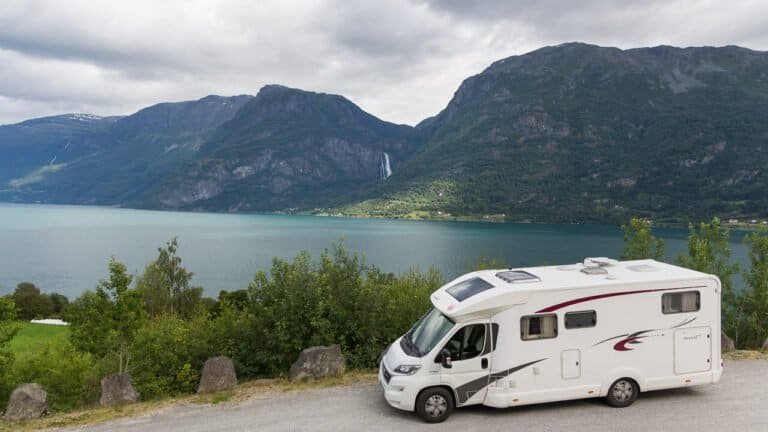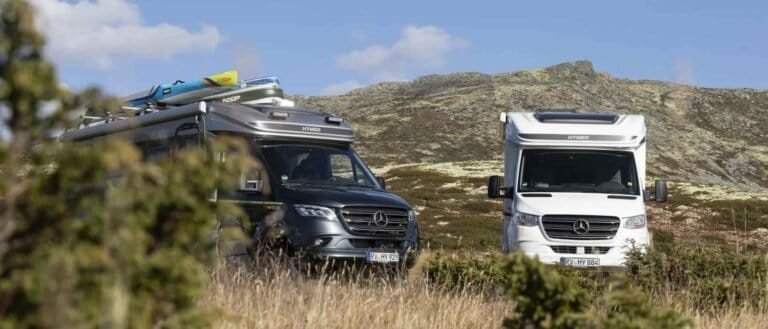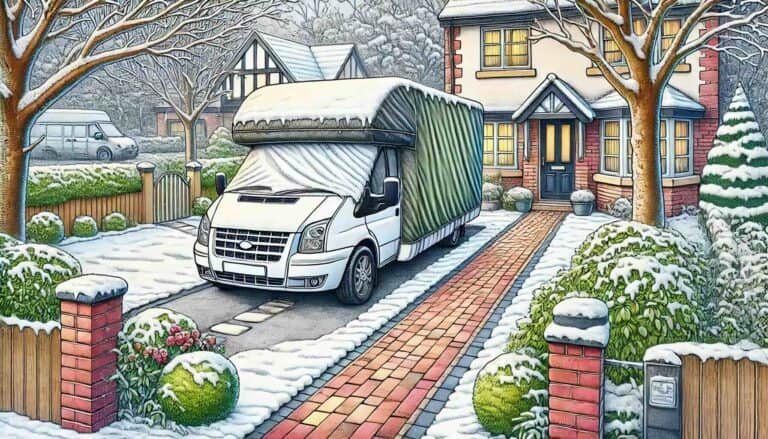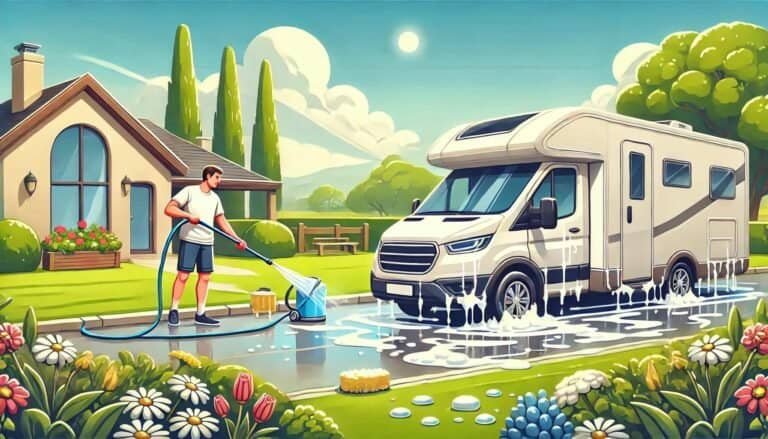Key Takeaways
- Introduction to owning a campervan or motorhome
- Essential maintenance tips
- Best practices for usage and storage
- Common challenges and solutions
Welcome to Campervan and Motorhome Ownership
Owning a campervan or motorhome opens up a world of adventure and freedom. Whether you’re exploring Ireland’s beautiful, rugged Wild Atlantic Way coastlines or embarking on a cross-country road trip through the Loire Valley in France, your new vehicle is the key to countless memorable experiences. As a new owner, there are several important steps to take and tips to keep in mind to ensure you get the most out of your investment.
Initial Steps After Purchase
- Registration and Insurance: Ensure your vehicle is properly registered and insured. This is crucial for legal compliance and protection against unforeseen events.
- Familiarisation: Spend time getting to know your vehicle. Familiarise yourself with the controls, features, and amenities. This includes understanding how to operate the heating system, water supply, and electrical hookups.
- Manual Reading: Thoroughly read the owner’s manual. It contains essential information about the operation and maintenance of your vehicle. Keep it handy for reference during your travels.
Understanding Your Vehicle
Familiarising Yourself with the Features and Controls
Each campervan or motorhome comes equipped with a variety of features designed to enhance your travel experience. From kitchen appliances to sleeping arrangements, understanding how to use these features will make your trips more enjoyable and stress-free.
Reading the Manual and Keeping It Handy
The owner’s manual is an invaluable resource. It provides detailed instructions on how to operate and maintain your vehicle. Make it a habit to refer to the manual regularly, especially when encountering issues or unfamiliar features.
Basic Troubleshooting
Knowing how to troubleshoot common problems can save you time and hassle. Here are a few tips:
- Electrical Issues: Check the fuses and circuit breakers if you experience electrical problems.
- Water System Problems: Ensure the water pump is switched on and that there are no leaks in the system.
- Appliance Malfunctions: Refer to the manual for specific troubleshooting steps for each appliance.
Essential Maintenance Tips
Proper maintenance is key to ensuring your campervan or motorhome remains in good condition and provides a reliable travel experience. Here are some essential maintenance tips every new owner should follow:
Regular Maintenance Schedule
- Oil Changes: Regular oil changes are crucial for keeping the engine running smoothly. Refer to your vehicle’s manual for the recommended oil change intervals.
- Tyre Checks: Check the tyre pressure and tread regularly. Properly inflated tyres improve fuel efficiency and handling.
- Brake Inspection: Regularly inspect the brakes for wear and tear. This is especially important for a heavy vehicle like a motorhome.
Keeping the Interior and Exterior Clean
- Exterior Cleaning: Regularly wash the exterior to remove dirt, grime, and road salt. This helps prevent rust and keeps your vehicle looking good.
- Interior Cleaning: Keep the interior clean by vacuuming and wiping down surfaces. This is especially important for maintaining a hygienic living space.
Winterising Your Vehicle
- Drain Water Systems: Before winter, drain all water from the pipes, tanks, and water heater to prevent freezing and damage.
- Seal Gaps: Check and seal any gaps or cracks to prevent cold air from entering and causing damage.
- Battery Care: Remove and store the battery in a warm place to prevent it from losing charge in cold weather.
Best Practices for Usage
Using your campervan or motorhome efficiently will enhance your travel experience and prolong the life of your vehicle.
Safe Driving and Handling Tips
- Adjust to the Size: Remember that campervans and motorhomes are larger than regular cars. Practice driving and parking in a safe area to get used to the size.
- Speed and Braking: Drive at a moderate speed and leave extra space for braking. The added weight requires more time to stop.
- High Winds and Tight Turns: Be cautious of high winds and take turns slowly to maintain stability.
Efficient Use of Space and Amenities
- Organise Storage: Use organisers and storage bins to maximise space. Keep frequently used items within easy reach.
- Multi-Use Items: Invest in items that serve multiple purposes, like a foldable table that can also be used as a storage box.
- Resource Management: Monitor your water, gas, and electricity usage to ensure you have enough supplies for your trip.
Managing Water, Waste, and Electricity
- Water Management: Be mindful of your water usage. Use water-saving fixtures and refill water tanks regularly.
- Waste Disposal: Always dispose of waste at designated dumping stations. Follow local regulations to avoid fines.
- Electricity Use: Use energy-efficient appliances and consider installing solar panels to supplement your power supply.
Storage and Security
Proper storage and security measures are essential to protect your campervan or motorhome when it’s not in use and to safeguard your investment from theft or damage.
Tips for Storing Your Vehicle When Not in Use
- Clean Thoroughly: Before storing, clean both the interior and exterior of your vehicle to prevent mould, mildew, and pests.
- Choose a Secure Location: Store your campervan or motorhome in a secure location, such as a locked garage or a reputable storage facility.
- Cover It Up: Use a breathable cover to protect the vehicle from dust, dirt, and harsh weather conditions.
- Ventilation: Ensure proper ventilation to avoid dampness inside the vehicle. Leave windows slightly open if it’s safe to do so.
- Battery Maintenance: Disconnect the battery to prevent it from draining. Store it in a cool, dry place and charge it periodically.
Security Measures to Protect Your Investment
- Install Security Systems: Consider installing an alarm system, GPS tracker, and immobiliser for added security.
- Use Steering Locks: A steering wheel lock can deter thieves from attempting to steal your vehicle.
- Secure Doors and Windows: Always lock all doors and windows when leaving your vehicle unattended.
- Insurance: Ensure you have comprehensive insurance coverage that includes theft and damage protection.
Common Challenges and How to Overcome Them
Even with the best preparation, you may encounter challenges during your campervan or motorhome ownership. Here are some common issues and how to address them:
Dealing with Weather Conditions
- Cold Weather: Insulate your vehicle and use a reliable heating system. Keep water tanks heated to prevent freezing.
- Hot Weather: Use window shades and fans to keep the interior cool. Park in shaded areas whenever possible.
- Rainy Conditions: Ensure all seals and windows are watertight to prevent leaks. Keep an eye on weather forecasts and plan accordingly.
Managing Limited Space
- Declutter Regularly: Keep your living space tidy by decluttering regularly. Only bring essential items on your trips.
- Use Vertical Space: Install shelves and hooks to utilise vertical space efficiently.
- Compact Furniture: Opt for compact, multi-functional furniture to maximise living space.
Troubleshooting Common Issues
- Electrical Problems: Check the fuses and battery connections if you encounter electrical issues. Refer to the manual for specific guidance.
- Plumbing Issues: Ensure there are no leaks in the water system and that the water pump is functioning correctly. Use RV-safe chemicals to maintain the toilet system.
- Engine Trouble: Regular maintenance can prevent most engine problems. Keep an emergency kit with essential tools and spare parts.
Frequently Asked Questions
What licences are required for driving a campervan or motorhome in Ireland? In Ireland, you need a standard Category B driving licence to drive a campervan or motorhome that weighs up to 3,500 kg. For heavier vehicles, a Category C1 or C licence is required.
How do I maintain the battery of my campervan or motorhome? Regularly check the battery’s charge level and keep it clean and dry. Disconnect the battery when the vehicle is not in use and recharge it periodically. Consider using a trickle charger to maintain the battery’s health.
What are the best practices for winter storage? Winter storage requires draining all water systems, sealing gaps, and removing the battery. Store your vehicle in a secure, sheltered location and use a breathable cover. Ensure proper ventilation to prevent dampness.
How can I improve the fuel efficiency of my vehicle? To improve fuel efficiency, drive at a steady speed, avoid rapid acceleration and braking, and keep tyres properly inflated. Regular engine maintenance and reducing the weight of carried items can also help.
How do I find reliable rental companies? Research online reviews and ratings of rental companies. Look for companies with a good reputation and positive customer feedback. Verify that the rental agreements and insurance policies are transparent and comprehensive.
What should I know about campervan insurance? Campervan insurance typically covers third-party liability, theft, and damage. Ensure you understand the coverage limits and exclusions. Consider additional coverage for personal belongings and international travel if necessary.
What should I do in case of a breakdown? Keep an emergency kit with tools, spare parts, and a first-aid kit. Contact roadside assistance and your insurance provider for help. Have a backup plan for accommodation if repairs take longer than expected.
How often should I service my campervan or motorhome? Follow the manufacturer’s recommended service schedule, usually every 10,000 to 15,000 kilometres or annually. Regular servicing includes oil changes, tyre checks, brake inspection, and general maintenance.
Can I install solar panels on my campervan or motorhome? Yes, installing solar panels can provide a sustainable power source for your vehicle. Ensure the panels are correctly installed and connected to a suitable battery system. Consult a professional for installation and maintenance.
What are some must-have accessories for campervan or motorhome owners? Essential accessories include a portable generator, solar panels, water filtration system, levelling blocks, and a first-aid kit. Additional items like comfortable outdoor chairs, a portable barbecue, and GPS navigation can enhance your travel experience.









